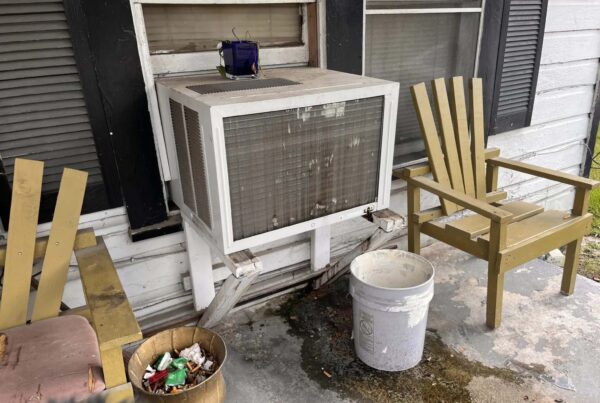Last week, the Texas Legislature entered its third session of the year, focusing on property tax relief.
Though lawmakers in both the House and Senate are in agreement on lowering property taxes, the chambers are split on how to do so.
The Tax Policy Center’s Richard Auxier joined the Texas Standard to help break down the plans currently being weighed by the Legislature.
This transcript has been edited lightly for clarity:
Texas Standard: Let’s begin with the tax relief plan in the Senate being spearheaded by Lt. Gov. Dan Patrick. He wants to focus on a homestead exemption. Could you say why?
Richard Auxier: So property taxes are calculated, you know, in three steps. One is that we assessed the value of the home. How much do we think it would sell for on the open market? Then we have a taxable value. Typically, places don’t tax the entire value of it. They’ll reduce it with things like a homestead deduction, which lowers the taxable value, which means it’s also lowering your bill. Listeners might also remember when they filed their federal income taxes, there’s a standard deduction that lowers their taxable income. It works similar to that. And then at the end, they apply a tax rate.
And so in the Senate, the homestead deduction, one thing that makes it different from some of the other proposals, it’s only for homeowners. And so a part of this bill will concentrate the tax cut on homeowners who will have a lower taxable value of their home and therefore pay less in property tax.
It’s not just this break for homestead deductions; there apparently are targeted tax breaks for businesses, money for school districts to lower their tax rates, and stricter revenue caps for school districts as well. And this sailed through the Senate Finance Committee and on to the full chamber with unanimous votes, apparently.
Over on the House side, their approach is something different: We hear it often referred to as “tax rate compression.” How does the House approach differ from the Senate approach?
Yeah, and so as an outsider, I don’t overstep – but this does seem like a fancy word for just tax rate cut. And the reason this differs from the Senate proposal is that they’re basically putting all the money they have for this tax cut into that lower rate. So that means homeowners will pay a lower rate and businesses will pay a lower rate because, again, remember, the homestead deduction only goes to homeowners. And so by plowing all the funds into the rate cut, they’re giving bigger benefits to homeowners and businesses.
But specifically, they are giving bigger benefits to the people with the most valuable property. This is just the way that math works, the way you figure out the taxes you take, the value of the property, multiply it times the rate. The more value you have, the larger you’re going to benefit from lowering that rate. And so, yes, someone who owns a $200,000 home will see a benefit from a lower rate, but someone with a $2 million home will see a far larger tax rate benefit.
So I want to make sure that I’m not oversimplifying this, but something that the lieutenant governor often says is, “look, this isn’t going to benefit homeowners because if you look at the amount of money that will actually come off of property tax bills, they’re going to be better off with the Senate version than with the House version.”
Of course, there’s a whole lot of political spin, and it’s hard to know who’s telling the truth here and, you know, how you’re parsing those numbers. But for an everyday homeowner in Texas – and I know that’s kind of hard to sort of average here – who makes out better?
Yeah, you never want to oversimplify, but we also want to be clear. Generally speaking, everyone who owns property would benefit from a rate reduction. But someone who owns a property that is not extremely valuable – again, think like a $200,000 or $300,000 home – they would see some benefit, but it would be far less from someone who owned a property worth millions of dollars.
A homestead deduction is specifically designed to concentrate relief on homeowners. And so people who own, say, like a $300,000 to $500,000, $600,000 home, they would see a larger tax cut as a share of their income. And again, this is why we have homestead deductions: It’s a way to concentrate benefits on homeowners and kind of more specifically like middle-income homeowners.
So from the standpoint of a short-term political impact, one would perhaps say that the Senate plan, the one being pushed by Lt. Gov. Dan Patrick, is going to be more appealing to those just basically looking at how much is shaved off the top of what I owe. Is that right?
Yeah. And this gets to something in the Texas debate where I would love to hear more clarity on why we’re cutting property taxes. I understand people like tax cuts, but you need to set up your goal because then you can align with the policy.
If the goal is to ensure that we give tax relief to homeowners in Texas, you would want to do something like this. But then I’m sure the governor and his allies would say, “No, the goal is actually helping everyone, including businesses,” because businesses will not benefit from a homestead deduction. But again, it’s why you have to clarify why we are doing this and tying the policy to that goal.
I think a lot of people say, “well, one of the reasons that lawmakers are saying we’re doing this is because of an historic budget surplus that the state has found itself with.” But does that not answer the questions sufficiently because there’s more money in the coffers?
I think that is a reason to cut taxes, but it’s one you want to be very careful with going forward, because as you said, this is a one-time surplus. Currently, Texas has a lot more money that it has to spend. And so returning that in a form of tax cut makes a lot of sense. But there’s other ways to do this.
It could have just been, for example, a one-time tax rebate. Texas could have asked homeowners to write in and then sent them a check. When you are lowering the rate or increasing the homestead deduction, that’s a permanent tax change. And so that’s going to affect this budget, but also the next and the next. And so this is always hard, but this really becomes about what’s going to happen in the future, because at some point, as it always does, there will be a budget crunch.
And when that happens, what will legislators do then? Will they increase property taxes? Because that’s very unpopular. If they don’t, they might, say, increase sales taxes, which creates a larger burden on lower-income homes. And so what you’ve just done is shifted who’s paying taxes instead of cutting them. And so you kind of have to be aware that this is also going to affect future budget decisions, which might not be as beneficial and rosy.














